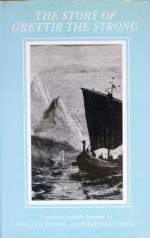Asmund would give to his son no faring-goods but victuals for the voyage and a little wadmall. Grettir prayed him for some weapon, but Asmund answered, “Thou hast not been obedient to me, nor do I know how far thou art likely to work with weapons things that may be of any gain; and no weapon shalt thou have of me.”
“No deed no reward,” says Grettir. Then father and son parted with little love. Many there were who bade Grettir farewell, but few bade him come back.
But his mother brought him on his road, and before they parted she spoke thus, “Thou art not fitted out from home, son, as I fain would thou wert, a man so well born as thou; but, meseems, the greatest shortcoming herein is that thou hast no weapons of any avail, and my mind misgives me that thou wilt perchance need them sorely.”
With that she took out from under her cloak a sword well wrought, and a fair thing it was, and then she said, “This sword was owned by Jokul, my father’s father, and the earlier Waterdale men, and it gained them many a day; now I give thee the sword, and may it stand thee in good stead.”
Grettir thanked her well for this gift, and said he deemed it better than things of more worth; then he went on his way, and Asdis wished him all good hap.
Now Grettir rode south over the heath, and made no stay till he came to the ship. Haflidi gave him a good welcome and asked him for his faring-goods, then Grettir sang—
“Rider of wind-driven steed, Little gat I to my need, When I left my fair birth-stead, From the snatchers of worm’s bed; But this man’s-bane hanging here, Gift of woman good of cheer, Proves the old saw said not ill, Best to bairn is mother still.”
Haflidi said it was easily seen that she thought the most of him. But now they put to sea when they were ready, and had wind at will; but when they had got out over all shallows they hoisted sail.
Now Grettir made a den for himself under the boat, from whence he would move for nought, neither for baling, nor to do aught at the sail, nor to work at what he was bound to work at in the ship in even shares with the other men, neither would he buy himself off from the work.
Now they sailed south by Reekness and then south from the land; and when they lost land they got much heavy sea; the ship was somewhat leaky, and scarce seaworthy in heavy weather, therefore they had it wet enough. Now Grettir let fly his biting rhymes, whereat the men got sore wroth. One day, when it so happened that the weather was both squally and cold, the men called out to Grettir, and bade him now do manfully, “For,” said they, “now our claws grow right cold.” Grettir looked up and said—
“Good luck, scurvy starvelings,
if I should behold
Each finger ye have doubled up with the
cold.”
And no work they got out of him, and now it misliked them of their lot as much again as before, and they said that he should pay with his skin for his rhymes and the lawlessness which he did. “Thou art more fain,” said they, “of playing with Bard the mate’s wife than doing thy duty on board ship, and this is a thing not to be borne at all.”




